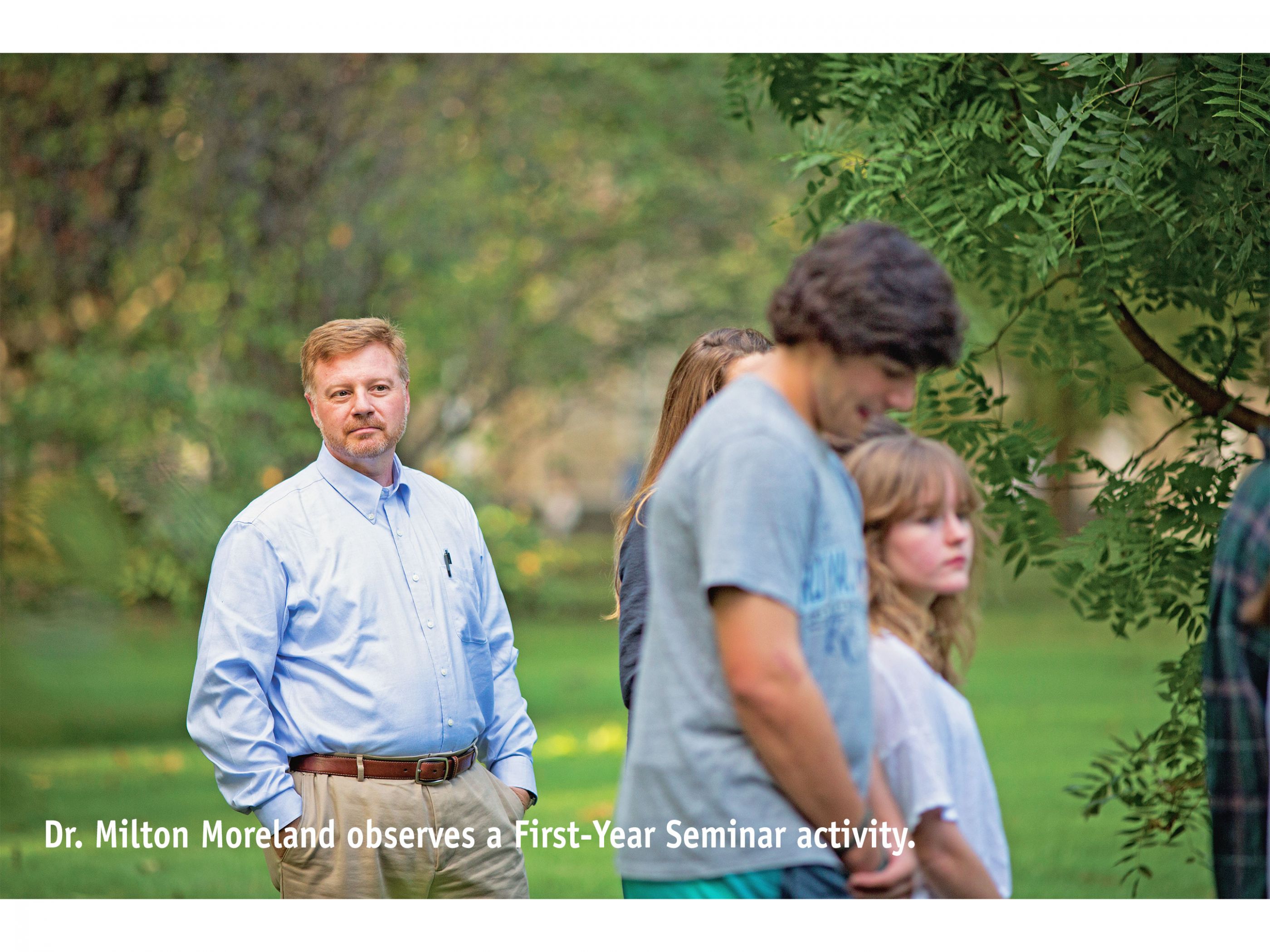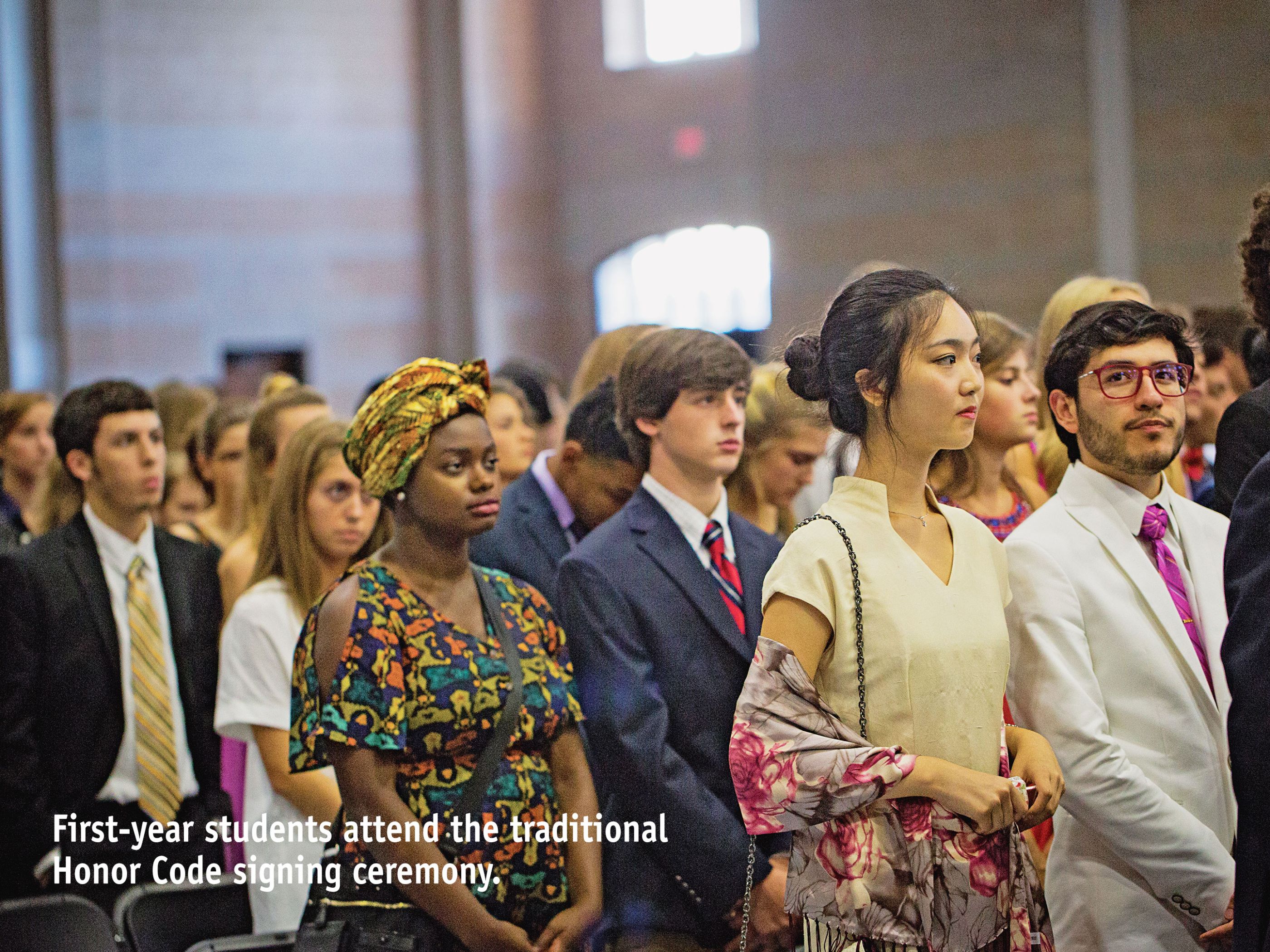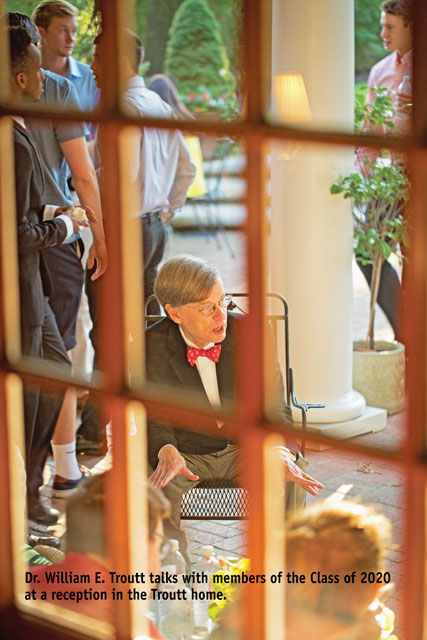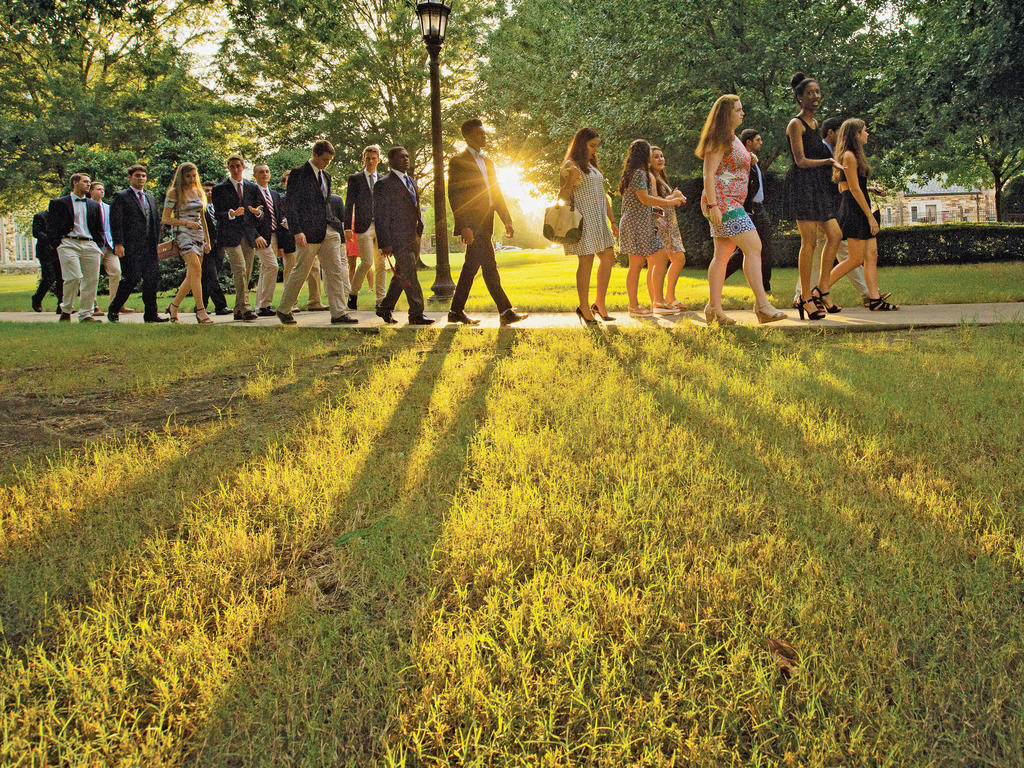The first year of college life can bring challenges to even the most outgoing, well-adjusted student. Home life and high school give way to campus life, with its round-the-clock opportunities, and a rigorous academic workload requiring self-discipline and lots of juggling. Add to that mixture a new community of 2,000 potential friends, an unknown roommate, and expectations to succeed, and the result can be a recipe for a difficult transition.
Two years ago, a team at Rhodes began looking into this pivotal point in the life of a college student and, from that effort, developed the First-Year Experience (FYE). With the goal of preparing its youngest scholars to succeed academically and to equip them for a diverse world both on and off campus, Rhodes instituted the yearlong integrative program to foster community and academic strength among the class of 2020 and for future classes as they come on board.
“We want our students to flourish at Rhodes,” says Dr. Milton Moreland P’16, P’20, dean of faculty and vice president of academic affairs. “Our intention with FYE is to provide a holistic support network to help them transition smoothly to academic life, as well as train them for life in an increasingly diverse world.”
 Many students feel compelled to create a friend group quickly, Dean of Students Carol Casey notes, choosing friends they feel most immediately comfortable with—usually those with similar backgrounds and experiences. “FYE gives them a chance to broaden their horizons and let them meet, and feel comfortable with, students with whom they may not ordinarily interact.”
Many students feel compelled to create a friend group quickly, Dean of Students Carol Casey notes, choosing friends they feel most immediately comfortable with—usually those with similar backgrounds and experiences. “FYE gives them a chance to broaden their horizons and let them meet, and feel comfortable with, students with whom they may not ordinarily interact.”
A Three-Part Program
A natural extension of Welcome Week—the week prior to the start of fall semester, during which first-years arrive on campus—FYE is a kind of yearlong orientation, says Moreland. FYE gives students more time and resources to navigate college and learn how to be a part of a community. The program takes place in three parts, beginning with Rhodes Reads, a summer requirement that assigns critical texts to incoming first-years.
For the current year, the Class of 2020 was required to read The New Science of Learning: How to Learn in Harmony With Your Brain by Dr. Todd Zakrajsek, who spoke to the class during Welcome Week. Additionally, they were asked to read either Salvage the Bones by Jesmyn Ward or The Immortal Life of Henrietta Lacks by Rebecca Skloot. Ward was the chosen author for Memphis Reads and appeared on campus in September.
The cornerstone of FYE is its First-Year Seminar program, taught by volunteer instructors from across campus—faculty, staff, coaches, librarians, and administrators—supported by a team of student assistants, also volunteers. The seminars break the first-year students into smaller groups for community building and conversation. For the third aspect of FYE, these seminar groups are asked to attend a handful of events together in order to further their connections. One such event was a full Class of 2020 trip to the National Civil Rights Museum.
First-Year Seminar
In the fall and spring semesters, first-year students gather each Monday night for the First-Year Seminar (FYS). The weekly seminars are aimed at helping students develop good study habits, understand the depth and breadth of the Rhodes community, and take good care of their mental and physical health.
 Darlene Brooks, director of the Paul Barret, Jr. Library, is on the team designing the seminar curriculum. “The seminar topics are planned to alleviate any challenges a student may have. We want our first-years to have a better start, to gain knowledge of how Rhodes works, to connect with others, and to have a greater satisfaction with their initial year,” she says.
Darlene Brooks, director of the Paul Barret, Jr. Library, is on the team designing the seminar curriculum. “The seminar topics are planned to alleviate any challenges a student may have. We want our first-years to have a better start, to gain knowledge of how Rhodes works, to connect with others, and to have a greater satisfaction with their initial year,” she says.
The curriculum team developed a syllabus for each class that all instructors are asked to follow, ensuring that each first-year student has a similar, if not identical, experience. “We wanted to get ahead of any issues that may crop up and give students a place to have important, sometimes difficult, discussions.”
Students Helping Students
Prior to leaving campus last spring, nearly 100 current students volunteered to act as student teaching assistants (STAs) for the 30 sections of FYS. Their roles range from taking attendance to facilitating conversations with their first-year peers to leading the class.
“I think FYE is most rewarding when as a group we share personal experiences,” says Natalie Scanlon ’18, an urban and community health major/Spanish minor on the pre-med track. “I have tried to be more vulnerable and share my own story. Our personal stories allow us to talk about more serious issues. My group is so amazing, and they always participate.”
Scanlon wanted to be a part of FYE because she felt it would be the perfect place to talk about difficult issues. Although Rhodes has traditionally held campuswide discussions to address any troubling events, she says she realized that the people who needed to hear the message weren’t always there.
Zaria Jones ’19 agrees: “FYE is a great idea because it allows the campus to become more inclusive, by getting everyone involved and participating in the hard conversations that are often ignored.”
A business major and Spanish minor from Memphis, Jones also wanted to be a part of FYE because she remembers her first year as an exciting, yet scary, whirlwind. “It’s nice to have a mentor or resource you can confide in and trust when you need guidance—or just need a listening ear,” she says.
STA Piyush Kumar ’17 recalls struggling with homesickness while
acclimating to a new college environment. “After awhile I was able to overcome this, thanks to the help of my friends,” he says. Many of the topics are covered briefly during Welcome Week, but Kumar, a biology/pre-med student, hopes that by having a weekly meeting students will be inspired to think about the topics on a deeper level and become more capable of handling difficult situations, and that the Rhodes community as a whole will become closer.
The Big Question
All of the good intentions of volunteer instructors, students, and FYE creators aside, no program can be considered a success without input from its participants. How are the first-year students themselves responding?
Memphian Tony Eskridge ’20 confesses to feeling a little confused at first about the purpose of the FYE, but after a few weeks he says he understands and appreciates why it is valuable: “Rhodes College is one of the most prestigious schools in the country. I believe the commitment to diversity and inclusion in the program only strengthens our school. I like how we’re able to be open and honest with each other. Monday at 5 p.m. is my time to take a load off and just talk with my peers.”
These discussions are very important to have as first-years, since incoming students will have a great impact on the culture of Rhodes, says Annie Jaffee ’20, a native of New York City. “FYE provides the space to feel comfortable openly discussing feelings and experiences,” she says.
The seminars are getting better and better as the semester continues and students feel more comfortable opening up with each other, says Will McLain ’20 of Charlotte, NC. “We are all having similar struggles, and I am glad to have the opportunity to discuss our situations with fellow students, the STAs, and the instructors.”
“When I decided to come to Rhodes, I had no idea that this predominantly white institution would care so much about diversity and educating its students about race,” says McLain. “I realized this after I watched the play We Wear the Masks, performed and written by Rhodes student Brittney Threatt ’17, which was amazing and gave students the opportunity to express their thoughts on racial and gender issues.”
For one of the first seminar activities, students wrote down concerns about college on sticky notes. At the next meeting, they worked together to categorize the concerns.
“We were able to take so much away from this activity,” says Eskridge. “As diverse as our group was, we had so many similar answers on our sticky notes. We worked on our team-building skills and had to be inclusive of everyone to put every note in the right category. If we were able to accomplish all this at just one meeting, I can’t wait to see what we accomplish by the end of the program!”
Jaffee adds, “It’s comforting to know that no matter the differences in our identities, there are significant overlaps in all of our experiences—the level of empathy increases as we all discover this.”
Discovery is certainly the backbone of intellectual life. Although the program is in its infancy, FYE seems already to show that it works to spread discovery in areas outside the classroom. That, for students willing to be open to its possibilities, the program can accomplish its goals to ease students into a key phase of their lives. That for all we bring to the seminar table as individuals, we still share the common bond of humanity.
